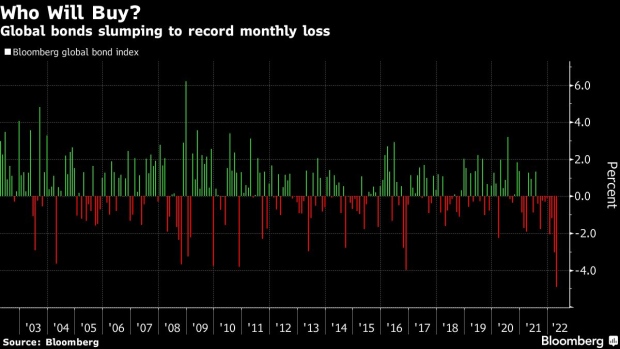Apr 28, 2022
Global Bonds Set for Worst Ever Month Before Burst of Rate Hikes
, Bloomberg News

(Bloomberg) -- Global bonds are closing in on their worst month on record as investors brace for a flurry of rate hikes in the coming week, including the most aggressive U.S. tightening since May 2000.
The Bloomberg Global-Aggregate Total Return Index has lost 4.9% in April, putting it on track for the biggest monthly drop since its inception in 1990. Australia’s three-year yields climbed as much as seven basis points to 2.74% while the rate on two-year New Zealand debt jumped eight basis points to 3.39%.
Fears of quickening inflation have torpedoed bonds worldwide, with a cut in Russian gas supply to Poland and Bulgaria and a red-hot Australian inflation print fueling expectations that the rout may continue. Swap traders are pricing in a half-point rate increase by the Federal Reserve on May 4 and also see the Reserve Bank of Australia and Bank of England raising borrowing costs next week.
“Until Fed pricing has run its course and stabilizes, global yields can rise further,” said Imre Speizer, a strategist at Westpac Banking Corp. in Auckland. “Investors will be reluctant buyers of bonds as long as Fed rate pricing keeps moving higher, or until they are more confident about pricing an eventual economic slowdown.”
Volatility in fixed-income markets is likely to remain elevated as investors weigh the possibility that aggressive tightening by major central banks may derail global growth.
In the corporate debt universe, high-grade notes have lost 5.3% so far this month, according to a Bloomberg multi-currency global benchmark, putting it on track for the biggest monthly slump since March 2020 when the pandemic rocked financial markets.
“Today‘s market offers very limited certainty and plentiful uncertainty,” Bank of America strategists Mark Cabana and Bruno Braizinha wrote in a note. “Current uncertainty is driven by the macro and inflation backdrop and geopolitical tensions, both of which will take time to sort out. Global central banks are also responsible for elevated uncertainty.”
©2022 Bloomberg L.P.






